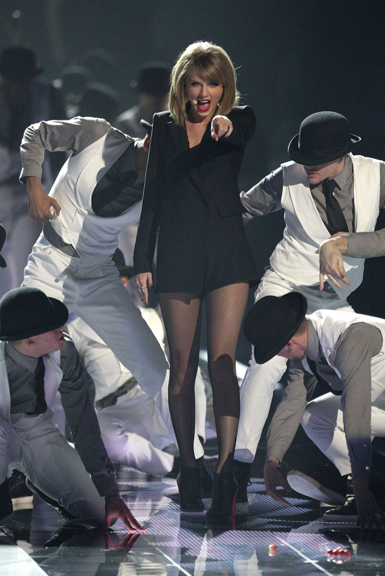Taylor Swift’s latest album looks like a bold departure, but the new trappings (including a "vocoder" which electronically "remixes" her voice) are a frame for her familiar brilliance – as a composer, lyricist, musician and a big sister to her millions of fans. Even its flaws are endearing. Subtlety has never been Taylor’s game but reputation’s occasional crassness is usually amusing ("If only you weren’t so shady", she mock-laments in "This Is Why We Can’t Have Nice Things"). As ever there are some awkwardly meaningless or clichéd metaphors ("If he can be a ghost then I can be a phantom"; "They’re burning all the witches even if you aren’t one"). But isn’t this embarrassing literalness all too familiar from the clumsy, maudlin teenage years which play home to most of her fans – and not entirely foreign to young adulthood?
Besides, it sometimes expresses itself in genius. "Gorgeous" features the delightfully dire "ocean blue eyes/looking in mine/I think I might/sink and drown and die" as well as the comically honest, "You’re so gorgeous/I can’t say anything to your face/Cos look at your face". When the song was released some fans made videos of themselves dancing along and pulling hilarious faces, which Swift reposted with delight. Her sense of fun, which she shares with her fans, dusts the album with her signature sparkle.
 reputation is another case study in Swift’s intriguing use of religious imagery for love and sex both to portray them as sinful ("I would fall from grace/Just to touch your face") and to consecrate them ("King of my heart,/body and soul"). Similarly, in "Red", the second song on her 2012 album of the same name, she sings that her relationship is "passionate as sin", where "sin" seems really to mean "lust" or even just "sex". The song immediately before it is "State of Grace", which portrays a relationship as religiously redemptive.
reputation is another case study in Swift’s intriguing use of religious imagery for love and sex both to portray them as sinful ("I would fall from grace/Just to touch your face") and to consecrate them ("King of my heart,/body and soul"). Similarly, in "Red", the second song on her 2012 album of the same name, she sings that her relationship is "passionate as sin", where "sin" seems really to mean "lust" or even just "sex". The song immediately before it is "State of Grace", which portrays a relationship as religiously redemptive.
Particularly obvious in Swift’s earlier albums is the language of "purity culture", which holds that girls who have sex before marrying are dirty and damaged. Most notable is "Innocent" (2010), where she reassures an imagined (but very real) young female listener that though she’s made (sexual?) mistakes, "You’re still an innocent". This survives into reputation (she is grateful that her boyfriend "loves me like I’m brand new"), but overall there is" Singing to 65,000 fans in Hyde Park two years ago, Swift accompanied the line "his clothes are in my room" with a hilarious wink across the tops of the heads of her tiniest fans, some of whom were wearing tour t-shirts as ankle-length dresses. In "Dress" there is no winking: "I don’t want you like a best friend," she sings, "Only bought this dress so you could take it off".
Taylor justly became famous for her breakup songs, which critics love to mock. The most important is "Dear John", in which she comes to terms with an abusive relationship and eventually puts the blame where it belongs: on the perpetrator, whom she calls out by name in the title. The song is a triumphant celebration of her post-breakup self: "I’m shining like fireworks over your sad empty town."
But as the teacher in Ecclesiastes almost says, there is a time to break (up) and a time to build. In reputation Swift’s concern is with building relationships, out of trust, respect, intimacy, and the everyday work of sharing and forgiving. The album celebrates both the dazzling excitement of desire and the precious mundaneness of being one whole person co-operating with another. In the final song, the synthesisers give way to piano chords, acoustic guitar, and Swift’s unaltered voice. The New Year’s Eve party is over, leaving "glitter on the floor" and the general detritus which follows a big night. She and her boyfriend are tidying up together. She sings: "I want your midnights/But I’ll be cleaning up bottles with you on New Year’s Day." It is exquisitely romantic.
Without wanting to push it too far, the album is an examination and celebration of the human condition in all its messy preciousness. Swift, as she sings herself into the album, can be petty, vindictive, jealous, sarcastic and sanctimonious – like most of us. But she can also be deeply affectionate. She has a taste for the glamorous but is able to recognise its ultimate vanity; she longs for something more ("King of My Heart"). She can and does laugh at herself. She wants instant gratification ("Gorgeous") but sees the value in "all of this silence and patience/pining and anticipation" (Dress); she understands that those things can be as truly an expression of love and intimacy as realisation. The album is imperfect, but is deeply loveable; it is full of life and keenly felt emotion; it is frequently sublime.
(Pic: Taylor Swift at San Jose, California, on 2 Dec 2017 at NOW! Poptopia concert. Credit: Daniel DeSlover via ZUMA Wire/PA)



 Loading ...
Loading ...
What do you think?
You can post as a subscriber user ...
User comments (0)